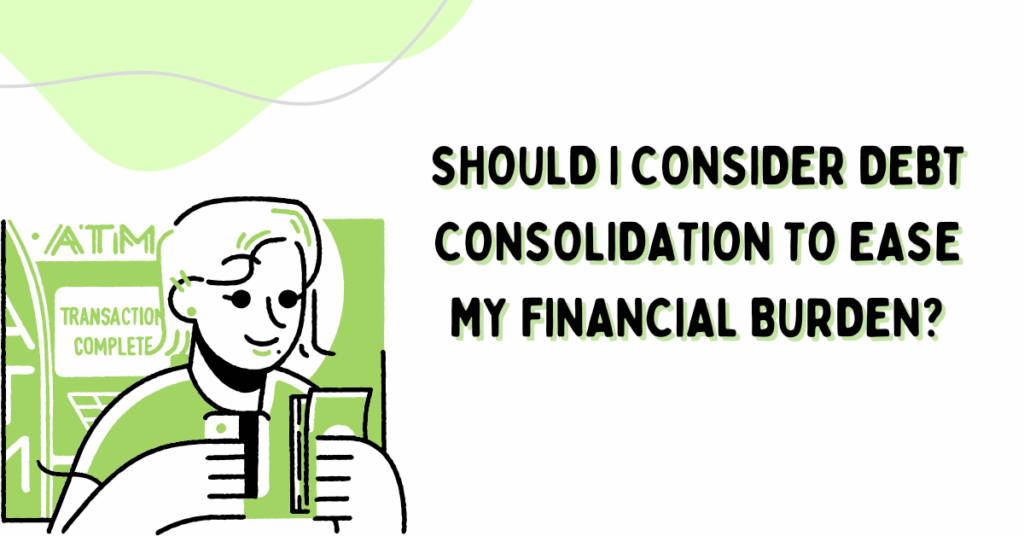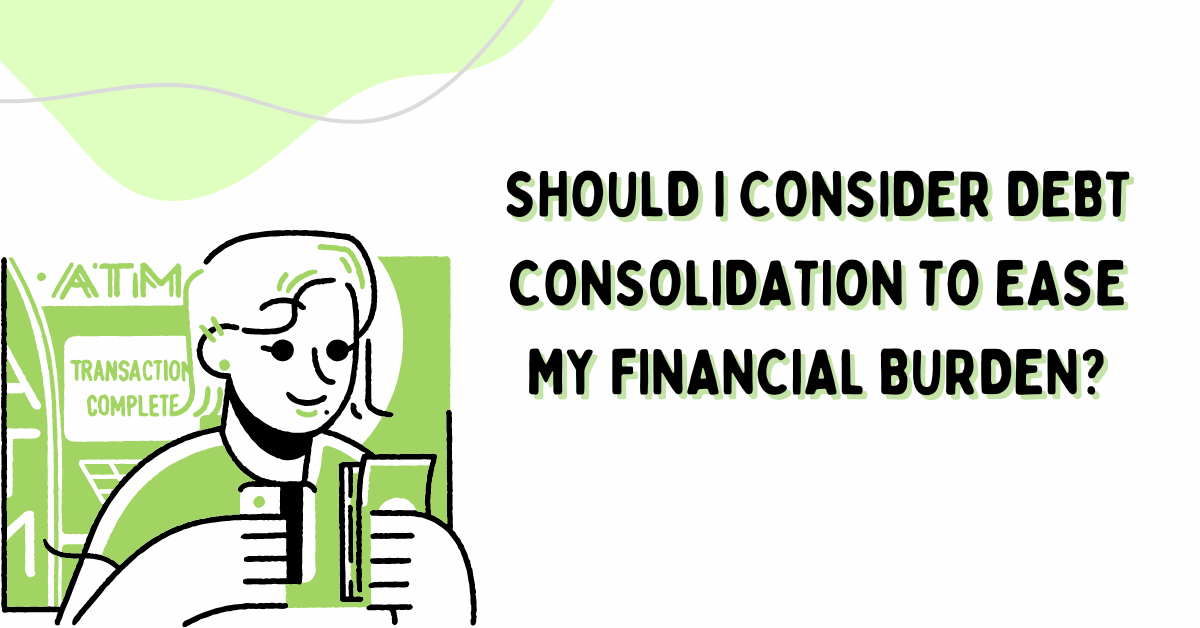Debt consolidation is a financial strategy that involves combining multiple debts into a single loan or payment. For individuals struggling with debt, debt consolidation can offer potential benefits such as simplifying payments, lowering interest rates, and reducing monthly payments. However, debt consolidation is not suitable for everyone, and it’s essential to weigh the pros and cons carefully before deciding whether it’s the right option for easing your financial burden.

Pros of Debt Consolidation:
- Simplified Payments: Consolidating multiple debts into a single loan or payment can streamline your finances by reducing the number of payments you need to make each month. This consolidation simplifies your financial obligations, making it easier to manage your budget and stay on top of your payments. Rather than juggling multiple due dates and varying amounts, you’ll have one consistent payment to focus on, providing clarity and organization to your financial life.
- Lower Interest Rates: Depending on your credit score and financial situation, you may qualify for a debt consolidation loan with a lower interest rate than what you’re currently paying on your existing debts. This can potentially save you a significant amount of money on interest charges over time. By consolidating high-interest debts into a single loan with a lower interest rate, you can reduce the overall cost of borrowing and pay off your debt more efficiently.
- Reduced Monthly Payments: Debt consolidation can help lower your monthly payments by extending the repayment term of your consolidated loan. By spreading out your payments over a longer period, you can reduce the amount you need to pay each month, making them more affordable and manageable within your budget. This can provide immediate relief for individuals struggling to meet their financial obligations and free up cash flow for other essential expenses.
- Fixed Interest Rates: Many debt consolidation loans offer fixed interest rates, which means your monthly payment will remain the same throughout the life of the loan. This provides stability and predictability in your budgeting efforts, allowing you to plan and allocate your finances more effectively. With a fixed interest rate, you won’t have to worry about fluctuations in your monthly payment due to changes in interest rates, providing peace of mind and financial security.
In summary, debt consolidation offers several advantages for individuals seeking to simplify their finances, reduce interest costs, and lower their monthly payments. By consolidating multiple debts into a single loan with a lower interest rate and fixed monthly payments, you can regain control of your finances and work towards achieving your financial goals more efficiently. However, it’s essential to carefully consider the potential benefits and drawbacks of debt consolidation and explore other debt relief options to determine the best approach for your unique financial situation.
Cons of Debt Consolidation:
- Extended Repayment Term: While lower monthly payments can provide short-term relief, extending the repayment term of your loan can result in paying more interest over the life of the loan. This means it may take longer and cost more to pay off your debts in full.
- Qualification Requirements: To qualify for a debt consolidation loan with favorable terms, such as a low interest rate, you typically need to have a good credit score and a stable income. If your credit score is low or your income is insufficient, you may not qualify for a consolidation loan or may only qualify for one with less favorable terms.
- Risk of Further Debt: Consolidating your debts into a single loan does not address the underlying issues that led to your debt in the first place. Without addressing the root causes of your financial problems, there’s a risk that you may continue to accumulate debt even after consolidating.
- Fees and Charges: Some debt consolidation loans may come with fees and charges, such as origination fees, application fees, or prepayment penalties. It’s essential to carefully review the terms and conditions of any consolidation loan offer to understand the total cost of borrowing.
Considerations Before Consolidating Debt:
- Extended Repayment Term: While lower monthly payments can provide short-term relief, extending the repayment term of your loan can result in paying more interest over the life of the loan. By spreading out your payments over a longer period, you may end up paying significantly more in total interest costs. This means it may take longer and cost more to pay off your debts in full, potentially delaying your journey to financial freedom.
- Qualification Requirements: To qualify for a debt consolidation loan with favorable terms, such as a low interest rate, you typically need to have a good credit score and a stable income. If your credit score is low or your income is insufficient, you may not qualify for a consolidation loan or may only qualify for one with less favorable terms. This can limit your options for consolidating your debts and may make it more challenging to find a solution that meets your needs.
- Risk of Further Debt: Consolidating your debts into a single loan does not address the underlying issues that led to your debt in the first place. Without addressing the root causes of your financial problems, there’s a risk that you may continue to accumulate debt even after consolidating. If you don’t make changes to your spending habits or address any underlying financial issues, you may find yourself in a similar situation down the road, with additional debt to repay.
- Fees and Charges: Some debt consolidation loans may come with fees and charges, such as origination fees, application fees, or prepayment penalties. It’s essential to carefully review the terms and conditions of any consolidation loan offer to understand the total cost of borrowing. These fees can add to the overall cost of the loan and may offset any savings you would otherwise gain from consolidating your debts. Additionally, prepayment penalties may restrict your ability to pay off the loan early, limiting your flexibility in managing your debt.
In summary, while debt consolidation offers advantages such as simplified payments and potentially lower interest rates, it’s essential to consider the potential drawbacks as well. Extended repayment terms, qualification requirements, the risk of further debt, and fees and charges are all factors to weigh carefully when deciding whether debt consolidation is the right option for you.
By understanding the pros and cons of debt consolidation and exploring alternative debt relief options, you can make an informed decision that aligns with your financial goals and circumstances.
Conclusion:
Debt consolidation can be a useful tool for easing your financial burden by combining multiple debts into a single loan or payment. However, it’s essential to weigh the pros and cons carefully and consider your individual financial situation before deciding whether consolidation is the right option for you.
By understanding the potential benefits and drawbacks of consolidation and exploring alternative debt relief options, you can make an informed decision that helps you achieve your financial goals and build a brighter financial future.



Hello
Hello
Thank You So Much.
Debt consolidation can be a useful tool for easing your financial burden by combining multiple debts into a single loan or payment.
d
Thanks